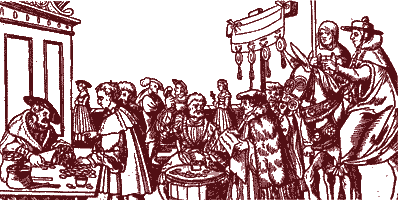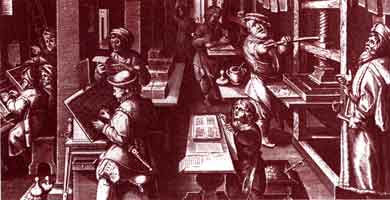|
Loading
|
|
|
Beyond the Reformation Century: The "British Archipelago"
 The
Protestant Reformation ushered in by Luther from the time of his initial protest
against papal indulgences in 1517 had major impact on the "British realms", effects
still encountered today.
The
Protestant Reformation ushered in by Luther from the time of his initial protest
against papal indulgences in 1517 had major impact on the "British realms", effects
still encountered today.
 When
Henry VIII and his Protestant-leaning minister Thomas Cromwell, both bent on creating
a highly authoritative and centralised, if not absolutist, monarchy, severed England
from Rome in the course of the 1530s, they created a powerful English state which
was answerable to no outside power - and remained so until the United Kingdom fully
entered the European Union, ending over four centuries of national sovereignty.
As Henry's realm turned its back on continental Europe, it switched its attention
to creating its first empire, within the British Isles. Wales was incorporated into
England in 1536, Ireland was made one of Henry VIII's kingdoms in 1541 and strenuous
attempts were made to absorb Scotland dynastically into a British union with England.
When
Henry VIII and his Protestant-leaning minister Thomas Cromwell, both bent on creating
a highly authoritative and centralised, if not absolutist, monarchy, severed England
from Rome in the course of the 1530s, they created a powerful English state which
was answerable to no outside power - and remained so until the United Kingdom fully
entered the European Union, ending over four centuries of national sovereignty.
As Henry's realm turned its back on continental Europe, it switched its attention
to creating its first empire, within the British Isles. Wales was incorporated into
England in 1536, Ireland was made one of Henry VIII's kingdoms in 1541 and strenuous
attempts were made to absorb Scotland dynastically into a British union with England.
Henry VIII did not introduce Protestantism into England, though it was brought in by the state, with variable amounts of popular support, under his Protestant son Edward VI (reigned 1547-1553) and daughter Elizabeth (reigned 1558-1603), following a brief Catholic restoration between 1553 and 1558 under her half-sister Queen Mary). Well before the end of Elizabeth's realm, most of Scotland had become firmly Protestant under the inspiration of Calvin's teachings, introduced by the reformer John Knox (1513-1572). Broad agreement on Protestant fundamentals improved the prospects for Anglo-Scottish dynastic union under James VI (of Scotland) and I (of England) in and after 1603, paving the way for the eventual political union of England and Scotland in 1707, a unification largely reversed since the 1990s. Much of the religious paving for a "British" union was Protestant, and from the sixteenth century Ireland voiced its resistance to an English embrace through a strong retention of Catholicism over most of the country. Centuries of effort to retain Ireland in a British union foundered from 1916, leading to the creation of a largely Catholic state over 26 of the island's 32 counties (though recent modifications in Ireland's 1937 constitution have muted the "special position" of the Catholic Church in the Irish Republic).
In the centuries since the Reformation, Catholicism often seemed alien to English or British aspirations and identity and was repressed by law as both a political and religious threat. The Act of Settlement of 1701 debarring Catholics or those married to Catholics from succeeding to the throne is a relic of that period. Most other civil rights were conceded when Catholic emancipation was passed by parliament in 1829. Subsequently, Catholicism enjoyed something of a renaissance in Victorian Britain, when the distinguished Anglican John Henry Newman (1801-1890) joined the Catholic Church, a move followed by the restoration of a Catholic hierarchy in 1850.
| 1534 | Henry VIII (reigned 1509-1547), awarded the title "Defender of the Faith" by the Pope for his defence of Catholic doctrine against Luther in 1521, is given an additional title by Act of Parliament: "Supreme Head of the Church of England" The English Reformation as a "breach with Rome" is initiated. |
| 1535 | Henry's opponents the Catholic statesman Thomas More and the leading cleric Bishop John Fisher are among those executed for opposing the king's ecclesiastical policies. |
| 1536-40 | The Catholic monasteries of England and Wales are suppressed. |
| 1553-8 | Henry VIII's strongly Catholic daughter Mary accedes and reverses the breach with Rome, executing around 300 Protestants. |
| 1558-1603 | Henry VIII's committed Protestant daughter Elizabeth introduces through Parliament in 1559 (Act of Uniformity, Act of Supremacy) a Church of England with clear Reformation doctrines. A string of further executions of leading Catholics, such as the priests Edmund Campion and Cuthbert Mayne, sets up a chain of killings of Catholic priests and laity for attempting to reverse England's Protestant settlement. |
| 1656 | Oliver Cromwell, Lord Protector since 1653 following the civil war defeat and execution (1649) of King Charles I, seeks the readmission of the Jews, opening the prospect of a less intolerant England. |
| 1678 | Allegations by Titus Oates of Popish Plot to restore Catholicism set off new wave of attacks on Catholic priests and laity under Charles II (reigned 1660-1685). |
| 1685-8 | Charles' Catholic brother James II succeeds and is seen as attempting to restore Catholicism. In 1689 he is replaced by his Protestant daughter and son-in-law Mary and William of Orange. |
| 1690 | James II's attempt to win back his throne using Catholic Ireland as a springboard is defeated by William. |
| 1701 | Parliament passes the Act of Settlement (still unrepealed) debarring Catholics and those married to Catholics from the succession to the throne. |
| 1778 | A first Catholic Relief Act allows Roman Catholics to inherit property and serve in the armed forces of the crown. |
| 1791 | A second Catholic Relief Act allows Roman Catholics to open places of worship. |
| 1829 | The Catholic Emancipation Act gives Roman Catholics civil rights. |
| 1846 | The leading Anglican High Churchman, John Henry Newman, is ordained a priest of the Catholic Church. |
| 1850 | Roman Catholic bishops and dioceses are restored to Britain by Rome. |
| 1912 | Carson counters the threat of unified Irish Home Rule by raising the spectre of an armed revolt of Northern Protestants, including sections of the army. |
| 1921 | An Anglo-Irish Treaty leads to the creation of the largely Catholic Irish Free State, followed in 1937 with the new constitution of the Republic of Ireland enshrining the special position of the Catholic Church. |
| 1952 | Pope John Paul II (pope 1978-) visits Britain and takes part in a service in Canterbury Cathedral. |
| 1968 | Civil rights marches in Londonderry are subject to police action. |
| 1970 | Canonization of 40 martyrs of England and Wales, executed during the Reformation. |
| 2001 | The United Kingdom has a Catholic speaker of the House of Commons and the leaders of two of the three main political parties are Catholics. |